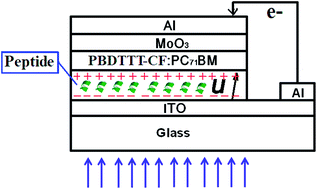Environmentally friendly biomaterials as an interfacial layer for highly efficient and air-stable inverted organic solar cells†
Abstract
Appropriate interfacial modification plays an important role in the high performance of organic solar cells. We report that a transparent cathode of indium tin oxide (ITO) modified with an ultrathin layer of peptide, an environmentally friendly biomaterial, shows an obvious reduction in the work function. Investigation of the device exhibits that the power conversion efficiency (PCE) was significantly increased from 2.12% to 8.13% with the use of the peptide modification. The inverted device with the peptide-modified ITO as the cathode showed significantly longer time efficiency delay in air than conventional forward devices with an active metal as the cathode. Because peptides are biological materials that exist naturally in living things, the results provide an environmentally safe method to fabricate highly efficient and air-stable organic solar cells.


 Please wait while we load your content...
Please wait while we load your content...